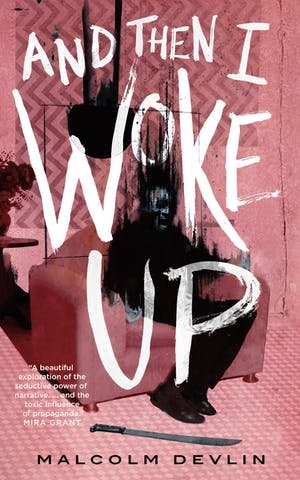TITLE: And Then I Woke Up
AUTHOR: Malcolm Devlin
176 pages, TorDotCom Publishing, ISBN 9781250798077 (paperback, also available in e-book)
DESCRIPTION: (from the back cover): In a world reeling from an unusual plague, monsters lurk in the streets while terrified survivors arm themselves and roam the countryside in packs. Or perhaps something very different is happening. When a disease affects how reality is perceived, it’s hard to be certain of anything…
Spence is one of the “cured” living at the Ironside rehabilitation facility. Haunted by guilt, he refuses to face the changed world until a new inmate challenges him to help her find her old crew. But if he can’t tell the truth from the lies, how will he know if he has earned the redemption he dreams of? How will he know he hasn’t just made things worse?
MY RATING: 5 stars out of 5
MY THOUGHTS: I love a good unreliable narrator, and Spence, the narrator of And Then I Woke Up, absolutely fits that description. Of course, being unreliable isn’t really his fault: his world has been turned upside down twice thanks to the latest plague, and sometimes his understanding of events is a bit muddled between what really happened and what he thinks happened. Reliable or not, Spence’s voice is captivating, pulling the reader along as he jumps between his present (returned to Ironside, as we find out in the opening pages of the book), his recent past (time spent outside the facility locating a fellow inmate’s plague-victim “crew”), and his earlier life (as a member of a different plague-victim “crew”). It’s not often I pronounce that a book is “unputdownable.” As much as I love novellas, I usually end up taking at least two sittings to read one of this length. But And Then I Woke Up turned out to be “unputdownable” for me, and I suspect it will also for many of my friends who love horror.
While I enjoy apocalyptic and post-apocalyptic fiction that takes time to explain the scientific or political underpinnings of whatever plague/crisis the world is facing, I really appreciated that author Malcolm Devlin did not spend any time on that aspect of world-building here. The nature of the plague, exactly how it works, is as unclear to the reader as it is to the character narrating the story. Spence is not a scientist, a reporter, a politician: he’s an average guy who has held down a number of jobs and is working as a dishwasher when the plague breaks loose. He doesn’t understand epidemiology; he just understands that suddenly some people are zombies, and some people aren’t, and that he needs to do whatever he needs to do to survive this zombie apocalypse.
Except that, as the book description above points out, it’s not actually the zombie apocalypse, but rather a distortion in how people perceive reality. This is a horror novel that is more-than-topical, taking on the rise of “false news” and the societal effect of the mindset that everyone’s opinion is as valid, if not more valid, than actual fact. Throughout the novella, Devlin touches on how just a few “true believers” can sway the perceptions of “followers” as well as how tenuous “deprogramming” efforts can be even when someone voluntarily leaves the cult (or in this case, the “crew”) when they start to question the beliefs they’re following.
While there is plenty of bloodshed and death in the book, it is not described in excruciating detail. This is not gross-out horror; it’s more psychological, as both the reader and Spence come to terms with the things he and others have done while subject to the plague. Concentrating on the psychological aspect, on Spence’s unsurety about certain events and absolutely certainty of others (along with hints that what he’s certain about may not be what actually happened), gives the book the narrative drive that kept me engaged from first page to last.
Absolutely recommended for folks who want their horror to be thought-provoking along with being disturbing and bloody.
I received an advance reading copy of this book for free from TorDotCom Publishing via NetGalley in exchange for an honest review. This does not affect my opinion of the book or the content of my review.
